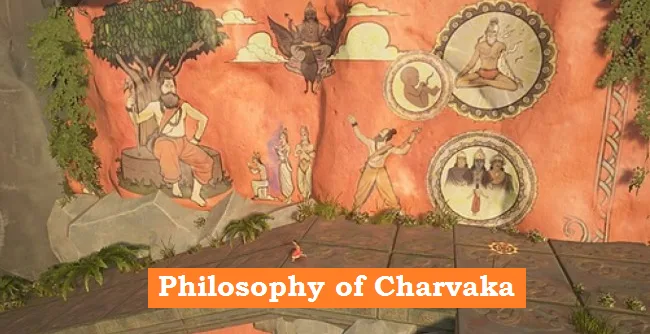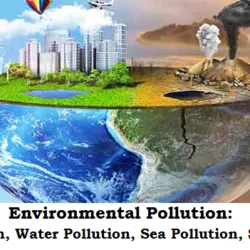
Charvaka Philosophy is one of the Nastika or Heterodox Schools of Indian philosophy. It holds direct perception, empiricism, and conditional inference as proper sources of knowledge, embraces philosophical skepticism and rejects ritualism and supernaturalism.
The founder of this system, according to a popular view is Sage Brishaspati, however, some scholars think that Charvaka was a prominent disciple of Brihaspati, the actual founder of the school. Some scholars are also of the opinion that Charvaka (charv meaning to eat) is not a proper name, but a common name given to a materialist, and it signifies a person who believes in ‘eat, drink and be merry’ and Charvaka (charu+vak= sweet tongued) doctrine is superficially attractive.
Charvaka was also called ‘Lokayatya’ which is the combination of the two words ‘loka’ (the world) and ‘ayata’ (basis). It accepts only the reality of the material world. In other words, Charvakas are the people who care only about the earth and not about the heaven.
Epistemology: (Study of Knowledge)
Some of the important Sutras of Brihaspati which are quoted in the various philosophical writings
Pratyaksam eva pramanam
Meaning: Pratyaksha is the only valid source of knowledge
It holds perception as the primary and proper source of knowledge.
Perception (Pratyaksa):
- It holds that nothing exists except what is perceived by five senses. Accordingly, they refuted inference (Anumana) and testimony (Shabda), which are accepted by almost all other schools of Indian philosophy as valid and reliable.
- Inference is not a valid means of knowledge because universal relation, the major premise on which it is made, is impossible.
- Charvaka’s epistemological argument can be explained with the example of fire and smoke.
Whatever has smoke has fire
The hill has smoke
Therefore the hill has fire.
Here a universal and necessary relation is assumed between the smoke and the fire.
- In inference we proceed from the known to the unknown and there is no certainty in this, though some inferences may turn out to be accidentally true.
- There are two types of Perception– external and internal; the former involves the operation of the five senses while the latter involves the operation of the mind. Knowledge is the outcome of contact between an external object and one of the five senses.
Rejection of Testimony (Shabda):
- Testimony does not have any value for Charvaka and accordingly Vedas are not authoritative and they are meaningless and misleading.
- Being based on inference, knowledge, derived from verbal testimony or authority is as precarious as inference and as in the case of inference, so here we often act on knowledge derived from authority on the wrong belief that it is reliable.
- They also held the belief that Vedas were invented by man, and had no divine authority. The Vedas suffered from several faults- errors in transmission across generations, untruth, self-contradiction and repetition of idea
Metaphysics: Nature of existence
Matter is the only reality:
- Since perception is the only reliable source of knowledge, whatever is known through it alone is real and matter becomes the only reality.
- They believe in the existence of only four eternal elements– earth, water, fire and air. They don’t accept the fifth element of Panchatatva– Akash as it is not an object of perception.
- The material elements themselves have got each its fixed nature (Swabhava). It is by the natures and laws inherent in them that they combine together to form this world.
- It tries to explain the world only by nature; therefore it is sometimes called Naturalism (Swabhava-vada).
Rejection of Metaphysical concepts:
Charvaka denied metaphysical concepts like reincarnation, God, other world and life after death, etc.
- God:
- Since all that exists is only matter, God who is supposed to be a supernatural and transcendental being does not exist as it cannot be the object of perception, the only valid means of knowledge.
- To them all natural phenomena was produced spontaneously from the inherent nature of things. There is thus no necessity for God.
- Consciousness or Soul (Atman):
- Charvaka denies soul as a surviving or transmitting entity.
- When the four elements of matter combine together in a particular mode to form the living organisms, the animal and human consciousness appear in it.
- They say that there is no consciousness apart from body which is evidenced by the fact that consciousness perishes with the body. Therefore body is the self and the body is the product of material elements.
- Consciousness arises from matter like the intoxicating quality of wine arising from fermented yeast.
- Liberation (Moksha):
- Charvaka rejected Mokshaas the ultimate aim of human pursuit.
- If liberation is freedom of the soul from its bondage to physical existence, it is absurd because there is no soul.
- If liberation means the attainment of a state free from all pain is an impossible ideal. Existence in this body is bound up with pleasure as well as pain. We can only try to minimize pain.
- For Charvaka death alone is liberation as it is the end there is nothing thereafter. (Maranameva pavargah)
Hedonism: Pursuit of Pleasure
Some of the important Sutras of Brihaspati which are quoted in the various philosophical writings:
‘Kama evaikah purushartha.’
Meaning: Enjoyment is the only end of human life
- Rejection of Karma: Charvaka neither believe in heaven or hell and for them paradise could only be on this earth nor in the theory of karma and accordingly they reject the notion of re-birth after death. Human is confined to this life and not other worldly or divine.
- Recognition of only the material values: Based on the perception theory, they accept only two of the four Purusarthas: Kama and Artha. Considers Artha a mean to achieve Kama.
- Kama as the primary goal: Pleasure (Kama) is the only end of human life. Since this is the only life for the individual, their exhortation is: ‘make the best use of it.
- The fact that there is pain in life should not deter the human beings from pursuing pleasure. “None gives up eating fish because there are bones and scales;”
- Thus pleasure is the natural ethical principle. Whatever action minimizes pain and maximizes pleasure is a good action.

 Home
Home Syllabus
Syllabus Contact Us
Contact Us




